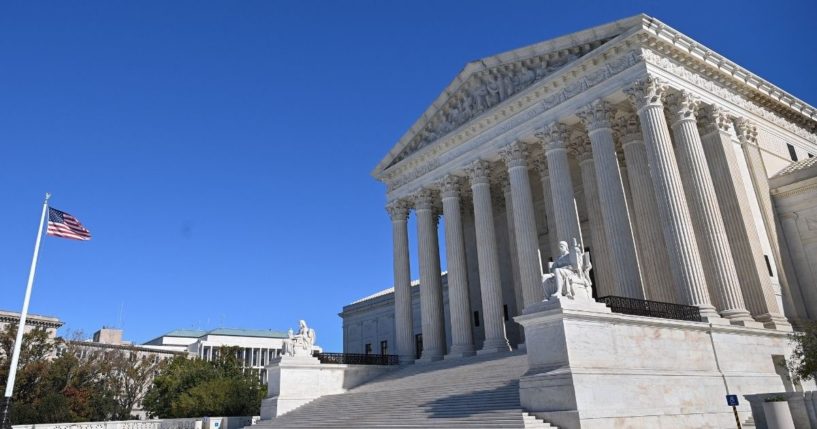
These Are the Four Things the Supreme Court Must Keep in Mind as It Takes on Abortion Question
Come Dec. 1, the Supreme Court will examine the question, “Whether all pre-viability prohibitions on elective abortions are unconstitutional.”
Like the apocryphal question, “When did you stop beating your wife?” this very question is pre-loaded with an illegitimate assumption.
The rules of logic tell us there is no such thing as a genuinely pre-viable human being. As long as I’m already purposefully living and growing in my mother’s womb and not yet born or aborted, I’m viable right where I am — not pre-viable.
The real question needing to be examined here is, “Whether any elective abortions are constitutional?”
Retired now, after a lifetime’s work researching the philosophy and language of human rights, I would humbly caution the Supreme Court justices to focus on the real question.
Caution No. 1
Having read huge swathes of the pro-abortion submissions to the Court regarding this case, I would first warn the justices against getting caught up in the prolific alarmism presented therein — beware whole litanies of alleged bad consequences for women should Roe v. Wade be overturned.
The pro-abortion rhetoric throbs with dire warnings about the harm that will be done to women denied “the right” to commission elective medicalized killing of their lively little daughters and sons in utero.
But the Court must assert here the common-sense truth that the harm done deliberately to what the founders called “the infant in the womb” cannot be justified by the possible temporal difficulties that may confront the infant’s mother if her infant is protected from being killed.
As with other grave difficulties we all face in our lives, elective killing is not an option. We must work the problem, not kill the child.
Caution No. 2
The Supreme Court’s first duty is to explain the law that protects the right to life of all members of “our posterity.” The lawful killing of innocents was never consistent with upholding the foundational principles of the Constitution.
Justices must be cautioned to confine themselves to interpreting the law, to stick closely to the actual laws of the Constitution.
The rightness or wrongness of any controversial practice being examined for its constitutionality should constitute the Supreme Court’s principal concern.
The Roe v. Wade Court in 1973 had no constitutional authority to institute a new law that removed protection of the law from defenseless innocents being targeted for deliberate killing by their mothers’ abortionists.
Justice Harry Blackmun, in examining abortion laws in his Roe v. Wade opinion, made a fundamental mistake in categorizing some human beings as property. This mistake was remarkably similar to the mistake made by Chief Justice Roger Taney way back in 1856 in the Dred Scott v. John Sanford case.
In examining slavery laws, Taney dehumanized slaves calling them “articles of merchandise” to exclude them from constitutional protection. He claimed, “[I]t is impossible to believe that these rights and privileges [in the Constitution] were intended to be extended to them.”
Regrettably, back then in Supreme Court history, a majority of justices nursed a distinct empathy with the slave-owners and refused to correct a practice that was inherently and cruelly wrong.
Caution No. 3
Constitutional law is the Supreme Courts’ foremost business — the rightness or wrongness of killing innocents.
Prediction and assessment of future disadvantages of overturning Roe and how they can be ameliorated, managed or averted is not the province of the Supreme Court.
Supreme Court justices are not social scientists or social workers or charity workers. They should not be aspiring to fix the social problems of all pregnant women who don’t want to be pregnant.
Unfortunately, today “reliance interests” figure prominently in the bulk of the pro-abortion submissions on the current abortion question being examined. Too much emphasis is placed on possible resultant hardships for mothers if unborn children are constitutionally protected once again.
Once before in history, in the Dred Scott decision, the Supreme Court allowed reliance interests to stall reform of unjust laws.
Popular support for slavery was maintained on the grounds that a group of people (slave-owners) and all those dependent upon them relied for their livelihoods and well-being on the continuation of the ghastly practice. Too many Americans had structured their lives around the right to own slaves and would experience hardship if that wrong practice was outlawed.
Taney asserted that “the right of property in the master was to be protected” and cited concern to prevent “injury and inconvenience to the whites…” He said, “[T]his [slave] traffic was openly carried on, and fortunes accumulated by it, without reproach from the people of the States where they resided.”
In refusing to overturn what was so wrong, Taney gave too much weight and sympathy to the concept of resultant hardships should slavery be abolished.
Right now as back then, it’s not the business of the Court to solve social and economic problems that may emerge from the correction of a bad law. It is the business of the Court to uphold the law as set out in the Constitution.
Caution No. 4
Justices must not be fooled by false reasoning that the infallibility of any law is synonymous with the length of time it has been in operation.
Some of the worst and most unjust laws in human history were cruelly kept in place for much longer than 50 years. They never became any more just or fair for the length of time that they were facilitated and condoned.
Reason tells us that the length of time an unjust law remains uncorrected should pressure us to remove that law, not to double down on it, to go on irrationally defending it.
Science and reason affirm that from conception, each unique human life is physically an unbroken continuum until ruptured only by death.
The inescapable truth is that all elective abortions are carried out on live prenatal human beings.
Paradoxically, it is precisely because these smallest human beings are viable (i.e., capable of living and thriving) that the abortionist is being commissioned to destroy their viability (i.e., to kill them.)
Take courage!
Roe v. Wade distorted that longstanding recognition of the duty set out in the Constitution’s preamble to secure the same blessings of liberty for our posterity as for ourselves.
Sooner or later, truth must overturn faulty precedents — the sooner the better. The Supreme Court should embrace this opportunity to ditch Roe.
First, they must re-instate the scientific truth, that “the fetus” targeted for abortion is a real human being, already conceived and growing, vitally alive and viable exactly where she or he is meant to be living and growing right here and now in her or his mother’s womb.
The second truth is that precedents in law like Roe v. Wade are not infallible. Supreme Court justices have a solemn duty to uncover and dismiss fallible decisions like Roe without further delay.
A majority of justices must find the courage to examine the mistakes in Roe honestly. If they seek the truth fearlessly, the opinion will write itself.
Truth is powerful.
The abolition of slavery posed immense problems for slave owners and their families and communities that had organized their livelihoods and their social and economic structures around the availability of slaves. Yet Americans today have learned to live without slavery.
So too, with intelligence and goodwill, we can all learn to live without abortion, to live by the commandment, “Thou shalt not kill.” We can all learn once again to marry and to love chastely and faithfully, and to take care of our children, who in turn will learn to live and to love without a “need” for abortion.
It’s time for older generations to admit our terrible mistakes and revise the excesses of the sexual revolution with all its socially destructive consequences for our families and our communities.
It’s time for a new generation to commit to and to pass on to their children a better way of living, a way that does not depend on any spurious right to harm their unborn children.
The views expressed in this opinion article are those of their author and are not necessarily either shared or endorsed by the owners of this website. If you are interested in contributing an Op-Ed to The Western Journal, you can learn about our submission guidelines and process here.
Truth and Accuracy
We are committed to truth and accuracy in all of our journalism. Read our editorial standards.
Advertise with The Western Journal and reach millions of highly engaged readers, while supporting our work. Advertise Today.












